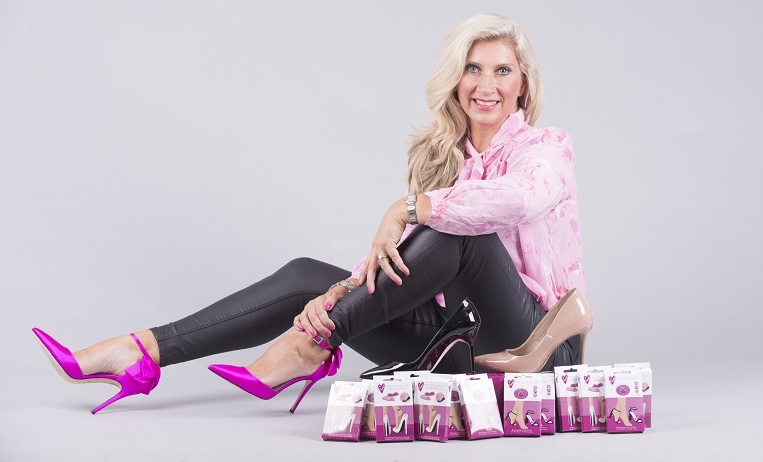How frustrations with slipping shoes helped create an international business

Posted: Tue 21st May 2019
Laura Birrell struggles to find shoes that fit her properly. One of her feet is slightly shorter than the other and that meant constantly dealing with blisters and worrying about walking.
"It was a really big issue for me," Birrell recounts. "I had to think about how far I could walk before getting blisters. Every time I left the house it was a drama. I was really frustrated that nothing on the market worked for me."
That led her to cobble a prototype together that would secure her foot inside the shoe. She returned to work after maternity leave several years later and realised she didn't want to deal with the hours and travel any more. The drive to do something new led her to launch Sticky Heelz in mid-2015.
"I was working in the background and looking at the design and materials. When I launched online I quickly realised I knew nothing about the sector, business model, distribution, logistics or anything. I realised I had to go on a massive learning journey," Birrell said.
Getting the right business support and partnerships
The realisation of the amount she had to learn led Birrell to look for support. She worked with mentors from Entrepreneurial Spark, a programme run by NatWest and is now called Entrepreneur Accelerator, and got a £40,000 grant through Scottish Edge.
The additional funding and advice allowed Birrell to do more product development and go on a trade mission to New York. The next step was to find a partner that could help with her aspirations to launch in North America.
"I realised I needed to get a business partner on board. We needed people on the ground to look like we're operating in the US. I found a company in Glasgow with offices in New York and they invested in my business.
"They're used to moving goods around the world. Retailers want to know you can source and have the cashflow to do orders of any scale. They need to know you can deliver it for 12 months because how they allocate that SKU," Birrell said.
Growing patiently
Birrell said getting listings with retailers took time. Each lists once a year, so you have to meet them at the right time. There's a lot of paperwork involved in exporting too and the level of complexity can be off-putting, she added.
"When you're in Canada retailers only want to deal with businesses that have a base in the country," she said, when asked for an example. "We had an opportunity with a large retailer but when it got the vendor forms and saw we were based in the UK they said you need to find another way to work with us."
The solution was to work with a Canadian-based fulfilment company and Birrell now makes sure they ask any potential retailers how they would contract with Sticky Heelz.
Know your pricing and margin inside out
Birrell is a chartered management accountant and stresses the need to be on top of your costs when selling internationally.
"Retailers will ask 'what's you recommended selling price?' and want 60% or whatever of that for their margin. Then I have to work out what that costs me. My manufacturing costs, import duties, transport etc. and build that up," she said.
The situation is made even more complicated by listing fees. Listing a single SKU (product variety) can cost from $2,000 (£1,600) to $30,000 (£23,400) in a major US retailer. The fee aims to de-risk taking on a new supplier - if sales are low they won't lose money.
The costs involved in listing and the low per unit price of the product means Birrell focuses on retailers with more than 200 stores. She expects the business to be in 1,000 US stores and 1,500 in Canada by the end of the year.
Researching markets and leveraging trade shows
Birell is about to go to Hong Kong to start exploring the potential to target retailers in China, the Middle East, Japan and Australia. The visit aims to look at packaging, branding, distribution models and more.
Attending a trade show will allow her to meet about 45 retailers in one place, with 10 minutes to pitch each of them. "They all come into one show over two days, it's an insane itinerary," Birell said. The format worked for the US expansion, saving the business a lot of money by reducing the amount of travelling she needed to do.
It's important to understand what other brands they are selling and pricing, and useful to establish their margin expectations up front she said.
Birrell advised small business owners to look for mentoring and grants that can support international expansion and allow them to take trips like this.
"I wouldn't be afraid to do it. You have to try," she said. "Make sure you do your preparation and cost everything out. It's fundamental you understand the cost implications and margins."
Get business support right to your inbox
Subscribe to our newsletter to receive business tips, learn about new funding programmes, join upcoming events, take e-learning courses, and more.
Start your business journey today
Take the first step to successfully starting and growing your business.
Join for free
